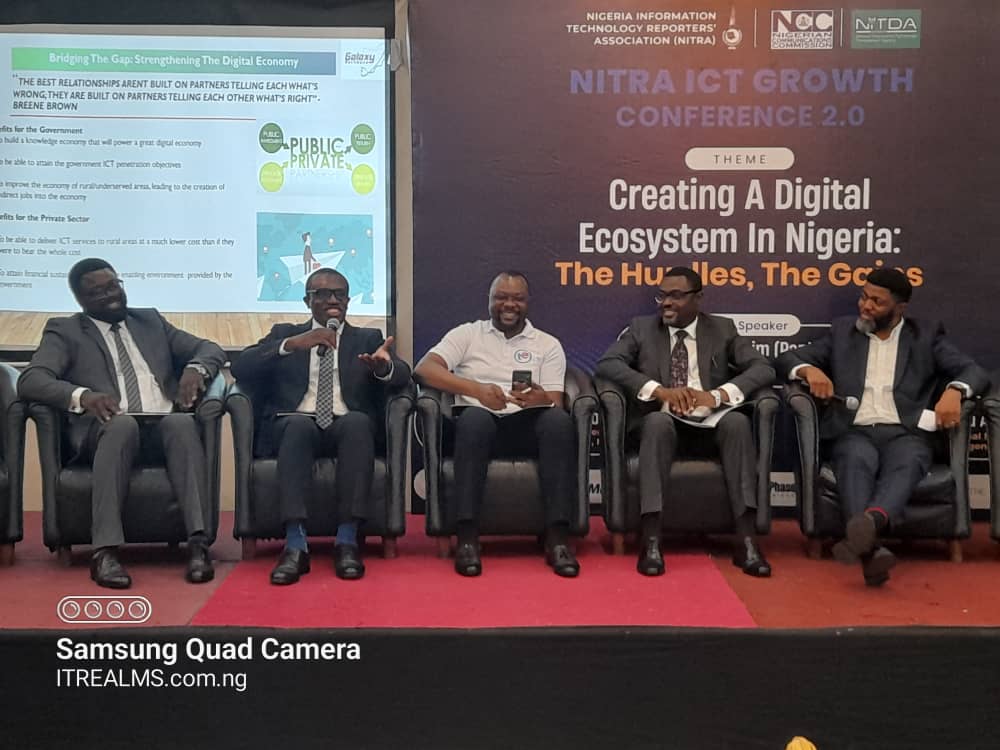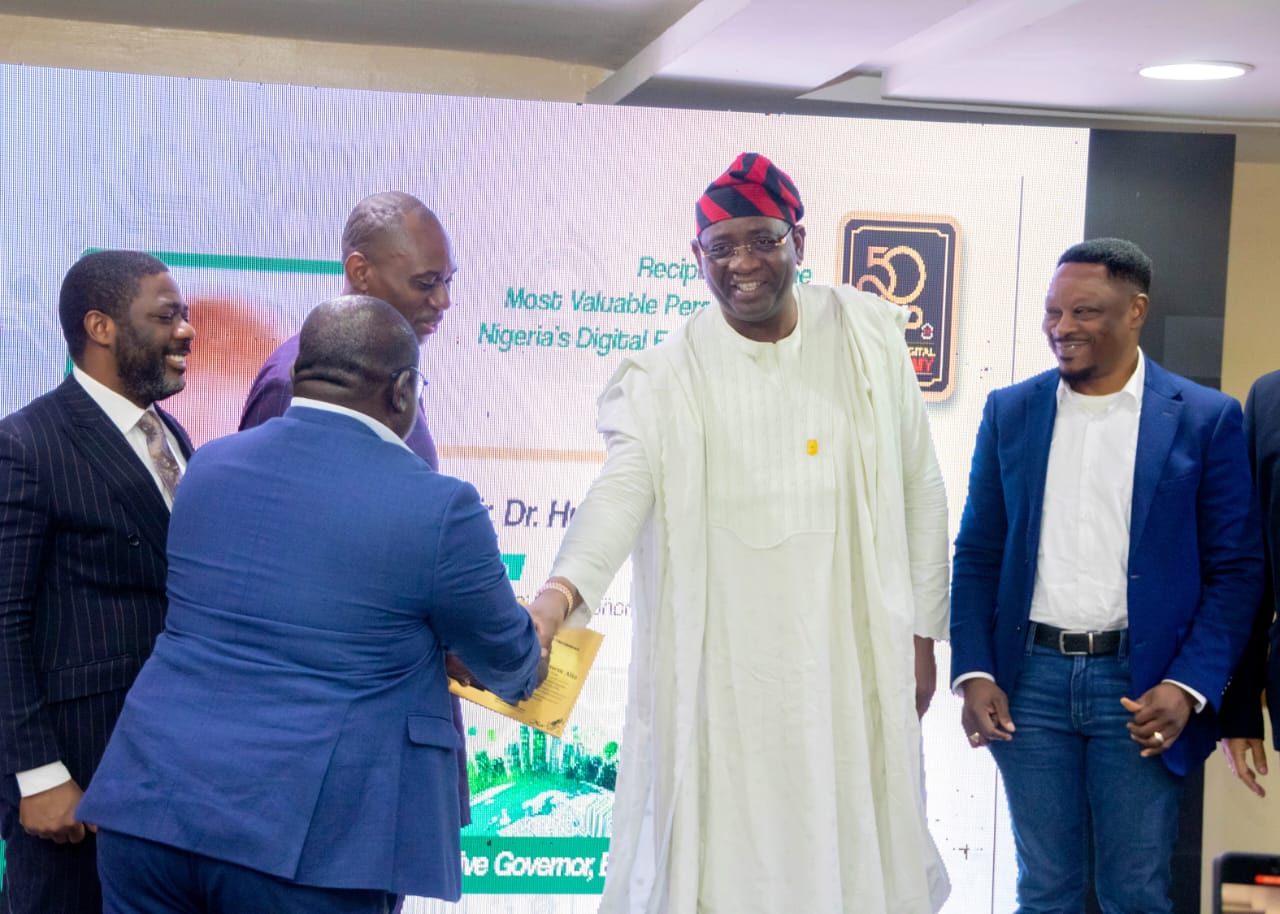Telecom
ICT Experts Harp On The Critical State Of Infrastructure Needs In Nigeria

Panelists at the just concluded NITRA ICT Growth Conference 2.0, have emphasized the need for an urgent review of Nigeria’s state of infrastructure so as to position the country to massively reap the benefits of a digital economy as obtained in some developed nations of the world.

Themed ‘Creating a Digital Ecosystem in Nigeria: The Hurdles, The Gains,’ the panelists drawn from both the public and private sector establishments, were of the consensus that infrastructure provisioning remained Nigeria’s surest pathway to building a robust digital economy.
At a second panel session during proceedings at the NITRA flagship technology conference held at the Oriental Hotel, Lekki Lagos, and moderated by Mr. Peter Oluka, Editor of TechEconomy.ng, the panelists agreed that efforts at building Nigeria’s digital economy cannot yield the much-desired fruit unless there is sustained commitment on the part of the government to prioritise the provision of infrastructure.
Seyi Olarenwaju, CFO of Medallion Data Centre said infrastructure is going to play a vital role in enhancing digital systems in Nigeria’s digital ecosystem, noting that “if there is no infrastructure in place, there is nothing.”
He stated that since governance has now been replaced by electioneering campaigns in preparation for the 2023 general election, the incoming administration should be focused, identify a particular infrastructure, and fix it, and expressed the hope that if in this regard, power is given priority attention, a lot of things will follow suit.
Kelechukwu Nsofor of Rack Centre, a carrier-neutral Tier III data centre who spoke from a data centre provider’s perspective, said power is the key infrastructure that drives a data centre business, describing it as basically the livewire of any data centre.
According to Nsofor, “The key infrastructure that we rely on is power. Power is basically the livewire of any data centre. Unfortunately, if you go back to 1999 since we started the current democratic dispensation in the country, what has been the installed capacity in terms of power? 20 years down the line, where are we today in terms of power?
“At a point, we were generating 1600MW, today, it’s still hovering around 3000MW. Where does that leave us as an economy of over 200 million people? So, if you look at the population growth rate and try to compare it with what we are growing in terms of power, you see that there’s a total disconnect.”
He said that Nigeria is blessed with a rich reservoir of policies and knowledge expertise but expressed worries that this has not been translated to results in the country’s power industry.
“Now, tying that to Rack Centre and indeed the data centre space, we have been generating our own power in the last nine years that we have been operating. And we’ve been fully in control of generating that power now. As we look to expand, we are also looking at ways where we can continue to generate power or do it more cost-effectively.
“We would like a situation where the government will actually stop the lip service that goes into infrastructure like power and actually start showing serious commitment by playing a major role in the provisioning of power infrastructure,” he said.
Noting that the digital economy is all about using the internet basically to push economic activities, Nsofor stated that what is critical even with the efforts at bringing in foreign direct investment, all the marine cables sitting on the coast of Lagos, is how to work with the private sector and knowledge experts basically on how to get things like multiple taxations and right of way out of the road.
“Operators can now push that capacity where it is actually needed. This will help us increase internet penetration, increase the digital economy growth, and push the economy forward,” he concluded.
In his contribution to the discourse, Babalola Olalekan of Phase 3 Telecoms admitted that the government was doing enough to provide infrastructure but stated that there was a need for stronger synergy between the government and service providers.
“There was a document released last year called Strategic Roadmap/Action Plan: A four-year plan 2021-2024. The key performance indices released in that document classified infrastructure in such categories as soft, service and hardware.
“When you look at the hardware infrastructure, we talk about how far we’ve gone in hardware infrastructure deployments like fibre cables. We talk of active devices and so on and so forth. But there’s something the government has put in place especially at the federal level by cutting down right-of-way charges all over the federation.
“Another area we have taken advantage of is the concession plan we call public-private partnership (PPP), where I expect the operators and players to key into and take advantage of our existing infrastructure, and opportunities.
“Another thing I will encourage we should be doing is a collaboration among players. All of us can only fight about a particular position or location. We can join hands on how to collaborate, leverage each other, and supply as a single network.
“So, I think the government is doing enough with policies. The onus is on us to tap into it, put more pressure on the government and be more up and doing in our collaborative efforts and take advantage of what is available to us through the government,” Olalekan said.
He said that going into the 2023 election, the most important thing to be focused on is security, stating that operators have many works to do out there in the field yet, they find it difficult to restore the network in the shortest possible time. “So, whatever government can do to make sure that our roads, our villages, our towns are secured, we will surely have a good general election.”
Chidi Okpala of Galaxy Backbone, in his intervention, acknowledged the fact that government understands the importance of infrastructure in growing the country’s digital economy, noting that one of the things the current administration holds dear to its heart, is infrastructure.
“Have they done all the things expected of them as government? Maybe not. But have they made some efforts in bridging the infrastructure gap? The answer is yes. But there is a whole lot of learning, a whole lot of training in trying to create that awareness, into fully understanding how this impacts the day-to-day living of everyone.
“As an organisation, what we are trying to do is to bridge that gap of understanding especially, people in leadership level in government; to let them understand this is what this infrastructure stands for, this is what it is all about. It is not just for sending emails but how it affects your life, your family, and the work that you do.
“We have done quite a lot together with some of the other organisations within the information technology space in the public sector. We are still doing a lot to raise that awareness of what this infrastructure means so that people can understand more and collaborate more.
“Collaboration is the key, talking about the benefits and not dwelling more on talking about the problems because sometimes when we do that, we cloud ourselves of the opportunities around us,” he said.
Okpala expressed the need for policymakers to be much more intentional about what the country is doing, how it the affects everyone, and how the efforts at building the country’s digital economy can be sustained.
The session, which was anchored by the Editor of TechEconomy, Mr. Peter Oluka, was unanimous with its position that infrastructure is the bedrock of ICT development and global competitiveness in Nigeria.
Telecom
FG to Deploy 80 Percent of 7000 Telecom Towers to North

Federal government has unveiled an ambitious plan to deploy 7,000 telecommunications towers across the country, with 80 per cent allocated to Northern Nigeria to address the region’s acute connectivity deficit.

The federal executive council had already approved the 7,000 towers project by March 2025 to support digital transformation and 5G rollout, with formal rollout scheduled to begin in the fourth quarter of 2025.
The project’s first tower will be installed next week in a rural Abuja community of 5,000, where insecurity compounds connectivity challenges.
Unlike conventional masts, these towers will double as digital hubs, providing internet to schools, hospitals, and local government offices.
“Most of these clusters are in the North. That’s the reality. There are a few clusters in the South-West, you know, that are not connected, but the bulk of the clusters are in the North, Bosun Tijani, minister of Communications and Digital Economy, told TVC recently.
He continued, “So, almost 80% of these towers will be going towards filling that gap in the North. The rest will now patch up where we have left off.
“Unlike traditional telecom masts, they will deliver internet to local schools, hospitals, and government offices, maximising their impact. Wherever we put them, we use the same infrastructure to serve the community.”
Tijani highlighted a collaborative model where mobile network operators will connect to the towers’ cables, reducing redundancy and optimising resources.
Nigeria’s digital landscape remains uneven.
As of January 2025, 128.3 million Nigerians, 54.3 per cent of the population, lack internet access, ranking the country fourth globally for unconnected populations.
Broadband penetration stands at 48 per cent, with over 50 per cent of Nigerians living there, facing significant barriers, including unreliable electricity and low digital literacy.
Progress has been made, with the number of people in unserved and underserved areas falling from 36.8 million in 2013 to 23 million in early 2025, yet the connectivity gap remains a formidable challenge.
The 7,000-tower initiative, distinct from the separate Project 774, forms part of a broader strategy that includes satellite technology, such as Starlink, and fibre-optic cables, which Tijani described as the backbone of reliable connectivity in advanced markets.
The government’s focus on the North reflects the region’s disproportionate share of unconnected communities, while the project’s design aims to address both digital and security challenges.
Telecom
Engr. Ikechukwu Nnamani Receives Two Prestigious @ABoICT Awards

Engr. Ikechukwu Nnamani, CEO of Digital Realty, West Africa’s leading interconnected data center facility, has been recognized for his outstanding contributions to Nigeria’s digital economy and the broader African ICT landscape.

L-R: Mr. Ken Nwogbo, Publisher and Editor-in-Chief of CommunicationsWeek Media, Editor Engr. Ikechukwu Nnamani, CEO of Digital Realty and Dr. Muhammed Rudman, Chief Executive Officer, Internet Exchange Point of Nigeria (IXPN) at the 2025 Africa’s Beacon of ICT (ABoICT) Merit and Leadership Awards, organized by Communications Week media.
At a ceremony in Lagos, Nnamani was named among the Top 50 Most Valuable Personalities in Nigeria’s Digital Economy by KnowHow Media.
According to the organizers, this recognition reflects his unwavering commitment to innovation within Africa’s tech ecosystem.
Segun Oruame, Vice-Chairman of KnowHow Media, emphasized Nnamani’s significant impact on Nigeria’s ICT landscape, highlighting his role in advancing the country’s digital economy.
Adding to his accolades, Nnamani was also honored with the ICT Growth Impact Award in Data Centre Infrastructure at Africa’s Beacon of ICT (ABoICT) Merit and Leadership Awards, hosted by Nigeria Communications Week.
This award acknowledges his instrumental role in developing telecom and ICT infrastructure across multiple African nations, including Ghana, Togo, Liberia, Sierra Leone, Ivory Coast, Senegal, Kenya, Uganda, and Angola.
Expressing gratitude for the recognitions, Nnamani dedicated the awards to his team at Digital Realty, acknowledging their continuous support.
He reaffirmed his commitment to fostering industry growth and driving innovation across Africa.
Telecom
SBTS Group CEO Evelyn Lewis Named Among Nigeria’s Top 50 Digital Economy Leaders for Youth-Focused Tech Initiatives

Evelyn A. Lewis, CEO of SBTS Group, has been named one of Nigeria’s “50 Most Valuable Personalities in the Digital Economy” by IT Edge News.Africa, recognizing his visionary leadership in digital transformation, innovation, and youth empowerment.

Presented during the “Nigeria: State of the Digital Economy 2025” colloquium and awards ceremony in Lagos, the recognition highlights Lewis’s role in shaping Nigeria’s digital future. The high-profile event, organized by Knowhow Media (publishers of IT Edge News.Africa), brought together top policymakers, digital innovators, and ecosystem enablers across public and private sectors.
At the center of Lewis’s recognition is his commitment to building Africa’s digital economy through skills and job creation. Under his leadership, SBTS Group—in collaboration with the Digital Bridge Institute (DBI)—is implementing an ambitious plan to:
- Train 5 million Nigerian youths
- Create 50,000 digital jobs by 2030
This initiative aligns with Nigeria’s National Digital Economy Policy and Strategy (NDEPS) and the Federal Government’s 3 Million Technical Talent (3MTT) program.
SBTS Group’s proprietary Intelligent Capacity Building Model (ICBM), developed under Lewis’s leadership, is at the core of this effort. The model closes the gap between digital training and employment, offering career-focused tracks in:
- Cybersecurity
- Software Development
- Artificial Intelligence (AI)
- Business Process Outsourcing (BPO)
- Digital Entrepreneurship
ICBM is currently being rolled out across DBI campuses nationwide, forming a scalable framework for skills development.
SBTS and DBI will kick off the next phase of their national rollout with new training and BPO centres in Abuja and Enugu, scheduled for launch in June 2025. These centers are expected to create over 5,000 jobs in their first phase, acting as blueprints for replicable, sustainable digital employment hubs nationwide.
Beyond training, SBTS has also built a national unified digital learning and registration platform for DBI. The system integrates national identity tools such as NIN and BVN, supports student sponsorships, facilitates enterprise partnerships, and enables career tracking—laying a foundation for a data-driven, transparent digital skills ecosystem.
“This award reaffirms our commitment to building Africa’s digital economy from within,” said Evelyn Lewis. “At SBTS Group, we believe that human capital is Africa’s greatest asset. By empowering our youth, we’re investing in a future where Africa leads in innovation and competitiveness.”
The 50 Most Valuable Personalities (50MVPs) initiative annually celebrates visionary leaders accelerating Nigeria’s digital transformation. The 2025 edition recognized contributors across tech, governance, and entrepreneurship under the theme:
“Accelerating Nigeria’s Digital Transformation: Insights on Challenges and Emerging Opportunities.”
Other 2025 honourees include:
- Obadare Peter Adewale, CVO, Digital Encode
- Nentawe Yilwatda, Minister of Humanitarian Affairs & Poverty Reduction
- Ayọ̀wándé Àdalémọ, CEO, Wave5Wireless
- Krishnan Ranganath, Regional Executive, West Africa & Morocco – Africa Data Centres (ADC)
- Ike Nnamani, CEO, Digital Realty
- Daser David, President/CEO, Digital Bridge Institute
- Suleiman Isah, Commissioner for Communications Technology & Digital Economy
- Shuaibu Kabir Bello, CEO, KMDC
- Olawole Owoeye, Co-founder, Cedarview Communications

 Telecom2 days ago
Telecom2 days agoTelecom Subscribers Decline By 43m in One Year

 E-Business2 days ago
E-Business2 days agoNigeria Launches Cybercrime Team with Commonwealth, UK Support

 E-Financial2 days ago
E-Financial2 days agoSERAP Drags CBN to Court over Alleged Failure to Disclose LG Allocations

 Telecom2 days ago
Telecom2 days agoNCC Orders Telcos to Compensate Subscribers for Outages More than 24 Hours

 General News2 days ago
General News2 days agoHEDA Sues FG, Oil Giants over Alleged Unlawful Oil Licence Transfer

 Telecom2 days ago
Telecom2 days agoIHS Nigeria, NSCDC Partner to Protect Telecoms Infrastructure

 Telecom20 hours ago
Telecom20 hours agoEngr. Ikechukwu Nnamani Receives Two Prestigious @ABoICT Awards

 E-Financial20 hours ago
E-Financial20 hours agoEFCC Recovers over N20Bn Stolen by Hackers from 6 Banks in Nigeria



























